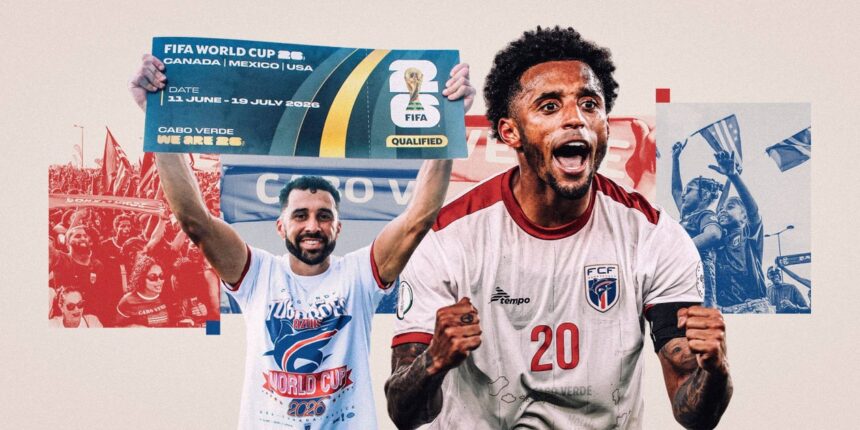In our Destination World Cup 2026 series, we will be telling the stories of players, teams and countries as they prepare for next summer’s tournament. To kick us off, Nick Miller travelled to Cape Verde to witness a remarkable underdog story.
Dailon Livramento was slumped on the floor. Pico Lopes was looking for his dad in the crowd. Stopira was hugging everyone. Steven Moreira didn’t know what to do with himself.
“For the moment, I don’t think I know how I feel,” Moreira, the Columbus Crew defender, told The Athletic, with a massive grin on his face that suggested he’d figure it out soon enough.
But it’s difficult to know how you’re supposed to feel when you’ve just helped your country qualify for the World Cup for the first time. And particularly when you are the second-smallest nation to ever make it to the biggest sporting event on the planet, after Iceland.
Cape Verde, a collection of 10 islands off the west coast of Africa with a population of around 525,000 and which was a Portuguese colony until 1975, have done something improbable.
They needed a win in their final qualification game against Eswatini to finish the job and top a group featuring Cameroon, a team who have been at eight of the past 11 World Cups. On paper, Monday’s match looked like something close to a walkover against a side who last won a World Cup qualifier in 2015. But for the first half, it didn’t feel like that — 45 minutes that was less a football match, more an entire nation having a nervous breakdown.
Officially, there were about 15,000 people inside the stadium. But given how packed the aisles and gangways were, the real figure was probably higher. Tickets were tough to come by: they were sold at petrol stations and pastry shops around Praia, the capital city. Some were sold online, specifically to those in the diaspora, but many of those ended up in the hands of relatives back in Cape Verde. Wherever they bought their tickets, they were tense: was their big chance slipping away?
But all of that tension dissipated three minutes after the break, when Livramento forced home a loose ball, at which point everyone in the stadium lost their minds. They were just recovering their senses six minutes later when Willy Semedo turned home a second.

Roberto Lopes, left, and Garry Rodrigues celebrate World Cup qualification (Cristiano Barbosa/Sportsfile via Getty Images)
The remainder of the half was a celebration. Passes were being greeted with an ‘Ole!’ as early as the 65th minute. A policeman started whipping the crowd up, the occasion overriding his professional duties.
And in stoppage time, it was capped perfectly when the 37-year-old Stopira — who had retired a couple of years ago but returned for this campaign — forced home the third at the back post. The team celebrated with him as if they had scored the goal themselves. “We needed him, so he came back, gave us good vibes, good energy,” says Moreira.
Off came his shirt and his heart monitor vest. The referee stood there with his yellow card for what felt like 10 minutes, waiting for Stopira to come back down to planet Earth. It’s likely that nobody has ever cared less about being booked than him in that moment.
“I’m just so happy for him,” Moreira adds. “For everyone.”
Zito de Pina travelled to Praia from Boston to see the big match. Massachusetts is home to a large Cape Verdean population and he runs a website dedicated to the country’s sporting exploits, Criolo Sports. He reckons that there were 50 people on his flight who were also making the pilgrimage. “I had to be here for this,” he says.
He peers at me quizzically when I ask if qualifying for the World Cup would be the greatest sporting achievement in the country’s history. It’s similar to the expression you’d expect if you asked a grown adult if they could count to five.
He humours me. “We got to the basketball and handball World Cups, but this would beat all of that.”
A fan called Ulysses goes one further: “It would be the greatest thing ever to happen in Cape Verde.” In sport? “In everything!”

Cape Verde fans make the most of their biggest football achievement (Queila Fernandes/AFP via Getty Images)
But here’s the thing: despite the tension during that first half, before the game nobody seems nervous. Or at least nobody says they are.
On the morning of the game, you’d think that the players were preparing for a day at the beach. They laugh loudly, there’s a light-hearted argument about something on someone’s phone. But no sense of tension.
Maybe it’s the attitude instilled in them by the coach, Bubista. He has spent his entire career in Cape Verde, stepping up from assistant manager, and has the vibe of a cool uncle, the sort of man who needs no encouragement to tell a few stories from his youth. He stalks the touchline against Eswatini in a pair of jeans.
On the day before the game, Bubista was asked at his pre-match press conference if this was going to be the biggest game of his life. There was a pause, a stare at the questioner, a small grin, next to him forward Ryan Mendes stifled a laugh: this would be the easiest answer he would ever give. He responded at some length, the gist of which was: well, yes, of course it is.

Bubista has taken Cape Verde to new heights (Franck Fife/AFP via Getty Images)
“It’s a special thing for us,” says winger Garry Rodrigues, when asked by The Athletic a couple of days before the game if the squad are feeling the pressure. “But we have to enjoy it. We have to grab it.”
At breakfast, some of the players crowd around a poster that has been given to them by a young kid called Lucas. It features pictures of him with virtually all the players in the squad, along with a good luck message. One of the players carefully takes it out of the breakfast room for safekeeping.
The evening before the game, the whole squad goes on a walkabout at a market on the Avenue Cidade de Lisboa in the centre of town, near the old national stadium. It’s mildly chaotic, but while there are a couple of fairly low-key security guards with them, there’s little concern when a woman lurches forward and envelops midfielder Yannick Semedo in a huge hug.

Cape Verde players on their pre-match walkabout (Nick Miller/The Athletic)
There’s applause, shouts of encouragement, and selfies all over the place. A couple of lads spontaneously whip off their shirts and twirl them around their heads. A woman produces a two-metre wide Cape Verde flag and waves it with gusto, posing for photographers and two film crews that have tagged along. There’s talk of a possible Netflix documentary.
It shows what this team means to the people, but also how accessible they are: Lucas was able to wander into the hotel and present this poster without any problems. None of the people at the walkabout were stopped. These players belong to the nation, for now at least.
Cape Verde’s success hasn’t happened by accident.
A few years ago, the country’s football federation made a concerted effort to make the most of its diaspora. There was widespread migration from the islands in the 1960s and 1970s, before they gained independence, meaning that there are little corners of Cape Verde all over the world.
It’s from these corners that a football team has sprung. The squad for the Eswatini game featured players born in Portugal, France, Ireland and the Netherlands, as well as Cape Verde. The 25 players ply their club trade in 15 different countries, from Moreira in the U.S. to Ailson Tavares in Israel via Lopes in Ireland.
“We have changed a lot,” the Cape Verde technical director, Rui Costa, tells The Athletic. “The under-17s are doing well, the women’s team could qualify for AFCON. We have a playing philosophy now. The next step is bringing through young players. Everybody wants to play for Cape Verde now.”

The modest trophy cabinet at the headquarters of Cape Verde’s football federation (Nick Miller/The Athletic)
They have qualified for the Africa Cup of Nations four times, reaching the quarter-finals of the last edition in the Ivory Coast. They surprisingly won’t be at the next one, later this year in Morocco, after making a mess of qualifying. But the progress is clear: at the turn of the century, they were ranked 182nd in the world. They’re now 70th, which will probably go up when the rankings are next calculated, and have been as high as 27th.
Money from FIFA has helped, allowing them to upgrade facilities, plus investment from China that helped build the national stadium, the site of the triumph over Eswatini.
The stadium is a bowl with a running track, about 20 minutes outside Praia city centre. Thanks to the source of its funding, many of the signs dotted around it are in English and Chinese, not Portuguese or Creole.
When Pele died in December 2022, Ulisses Correia e Silva, the Cape Verdean Prime Minister, announced the stadium would be renamed after the great Brazilian, a response to Gianni Infantino’s slightly eccentric suggestion that every country should name at least one stadium after Pele.
It was then delicately pointed out that Pele had never been to the stadium, or (as far as anyone could tell) to Cape Verde. So they stuck with Estadio Nacional.
Roberto ‘Pico’ Lopes is having quite a week. And qualifying for the World Cup isn’t even the biggest thing in it.
Famously recruited to the national team via a LinkedIn message in 2019 that he initially thought was spam, the Irish-born centre-back’s wife Leah is expecting their first child in a few days. He hot-footed it to the airport after the game, missing most of the celebrations so he could fly overnight back to Ireland to ensure he was there for the birth.
“Football isn’t the first thing on my mind,” he tells The Athletic a couple of days before the game, suggesting that impending fatherhood has helped him compartmentalise the pressure.
“You have to have that perspective. We know what it means. But my motivation is to get the job done so I can get home and hopefully see the birth of my first child. What better first family holiday than America for the World Cup?”

Roberto Lopes celebrates with Cape Verde fans (Cristiano Barbosa/Sportsfile via Getty Images)
If all of that wasn’t enough, his club side Shamrock Rovers have the chance to win the League of Ireland for the fourth time in five years when they play St Patrick’s Athletic on Friday. They could have sealed it the previous Friday, when Lopes was preparing for the Eswatini game in Praia, but they lost 1-0 to Shelbourne. The app on which Lopes was trying to follow that game failed, so he FaceTimed a friend and had them put their phone in front of the TV.
Pico qualifies because his father is Cape Verdean. He still has plenty of relatives on the islands, including aunts, uncles, multiple cousins and his grandfather, still working on the family farm aged 98. “He doesn’t do much of the heavy lifting these days, but he’s still out pointing the finger and telling people what to do.”
Growing up, he admits he didn’t know much about his heritage and was almost embarrassed to talk about it because he hadn’t asked the right questions. Playing for the national team has changed all that.
“I’ve learned so much about the culture, the people, the music, the food — what it means to be Cape Verdean. To go back now to Ireland and share those experiences… it’s amazing. Every day, I feel a bit more Cape Verdean.”

A fan flies the Cape Verde flag before Monday’s game (Nick Miller/The Athletic)
They came incredibly close to sealing qualification last week. They surprisingly went 3-1 down away to Libya, before one of the worst goalkeeping blunders you’ll ever see and a bundled Willy Semedo goal drew them level. They thought they had sealed it when Jamiro Monteiro was set free on goal and slotted home, but the linesman had raised his flag for an offside you would charitably describe as ‘tight’.
But doing it anywhere other than at home would have felt wrong.
After the game, the players celebrate with friends, relatives, and those who have travelled from far and wide to see this moment of glory. Livramento, who was born and raised in Rotterdam, has 15 cousins in attendance.
As Bubista attempts to answer questions from the assembled media, the players burst in and soak him with an array of liquids, at least one of which is the beer he emerges from the melee drinking. They all pile onto the team bus, which in short order is quite literally rocking as the team dances inside. At the front, Bubista is absolutely livid that they are boxed in by another bus, hampering their route away from the stadium.
Customary manager press conference invasion by the players. pic.twitter.com/FLIjAzmEVu
— Nick Miller (@NickMiller79) October 13, 2025
All week, players have been taking it in turns to carry around a speaker, which — when cranked up — feels like it has the power to take down buildings. It had been playing music from Cape Verde and other West African artists earlier in the week, but by the time they got back to the team hotel, someone had hooked up a microphone to it, and the players were taking it in turns to address their team-mates.
The celebrations go deep into the night. At the old national stadium, just down the road from the team hotel, a concert was put on featuring DJs and live music, including Livramento’s brother, a Dutch rapper who’s part of the group Broederliefde.
At the headquarters of the Cape Verde Football Federation, next to pictures of teams from years past, there’s a display case showing the key artefacts of the national team’s history. One of the more prominent items is a pennant from a friendly they played against Georgia earlier this year. You suspect there will be a few slightly more glamorous trinkets in that cabinet before too long.
“It’s for the people,” says Moreira. “They’ve been watching the team for a long time. I’m very proud to make history for them.”















